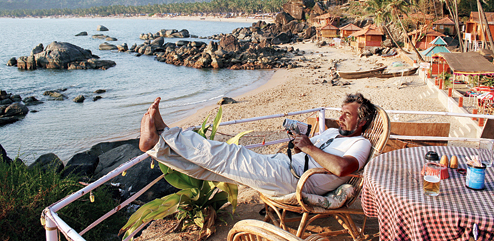It's a late rainy evening and Maria is preparing to leave her verdant South Goan beach-side village of Carmona for Scotland — and for good.
Maria isn't fascinated by the Scottish highland's stone castles and whiskey, but simply sees it as a gateway to a better life. Most of her relatives have been living in Scotland for well over a decade, and she's lured by the turnaround in their lives, and the pounds spent on picking up parcels of land on each visit home.
She won't need a visa, for Maria — till recently an Indian national — will travel on a Portuguese passport. After all, her parents were born in Goa while it was still under Portuguese rule, and before it was reclaimed by India on December 19, 1961.
Under Portuguese law, those born in former Portuguese colonies and before these colonies attained independence continue to be Portuguese. All they have to do is get their births and marriages registered in Portugal.
According to some estimates, five to six lakh Goans have migrated to Europe since December 1961. Bruno Gomendes, whose surname has turned into a household name for Portuguese passport aspirants (with every brother in the business), says that it was, however, after Portugal joined the European Union in 1986 that people started migrating more and more.
But a practice that was until recently out in the open is now being conducted in secrecy. And that's because an Indian law, always there but ignored, is being evoked.
Ever since two Goan politicians' nationality became an issue last November, the locals have become cagey. The two — Caetano Silva of the Goa Vikas Party and Glen Tiklo of the Bharatiya Janata Party — were members of the Legislative Assembly when it was found that they were Portuguese citizens.
Article 9 of the Indian Constitution does not allow you to be an Indian if you voluntarily acquire a foreign citizenship — and that, of course, means you cannot be an Indian MLA if you have a foreign passport. Goans who want Portuguese passports have to surrender their Indian ones.
But the problem is that many people in Goa have their Portuguese passports, but continue to live in the state as Indian nationals, holding government jobs and owning agricultural land.
Rumaldo Rodrigues, a Portuguese passport agent in Goa, points out that after getting a Portuguese passport, one has to leave India within six months. Many, however, flout the law and continue with their lives in Goa.
A quiet resentment is brewing among people who see the would-be migrants as 'anti-national' elements. 'People have been lodging police complaints against those who have registered their births and marriages in Portugal,' says Ave Cleto Afonso, a retired professor of philosophy, in his spacious office at Altinho.
But Goans stress that not all passport seekers are would-be migrants. 'Many of the Goans who get their births and marriages registered in Portugal do it to make their children or grandchildren eligible for Portuguese citizenship, and not because they themselves want to migrate to Portugal,' says Cyrilla Furtado, seated at a grand antique table in an equally grand and high ceilinged hall, in a quiet lane in the south Goan village of Chinchinim.
Despite the fear that has been spreading across Goa, the rush for Portuguese passports continues. Every day, Goans queue up at the grand Bishop's Palace on the Altinho hillock overlooking Panaji. They are there to have their names on baptism or marriage certificates rectified or authenticated, says Father Manuel Dias, chancellor of the Goa Archdiocese. And these are needed for their registration certificates that will get them their new passports.
Getting a Portuguese passport would take less than a couple of years and cost upwards of Rs 3 lakh or its equivalent in foreign currency. 'Some high-profile agents charge £1,000-1,400 for registering a single document in Portugal,' Rodrigues says.
Last year, the election commission in Goa said 11,500 Goans had given up their Indian passports in favour of Portuguese ones, and about a quarter had lost their voting rights, beginning 2008. Rodrigues says that he has helped facilitate 175 such passports over the last three years, with a 50 per cent annual escalation in figures.
But not many people openly talk about their Portugal plans any more.
Lalita and Anthony, a middle-aged couple who even some months ago were the toast of the family which couldn't stop bragging about their plans to leave for Portugal with their two kids, would rather not talk about this. 'There are rumours that we could be targeted,' Lalita says.
Those who leave Goa don't find it easier in a new country either. Take, for instance, Swindon, the Mecca for Goans in the UK seeking blue-collared jobs. 'They earn about £35 a day, spending about £100 a week on board and lodge, in a bedroom with four or five others,' Rodrigues says. 'In some cases they even sleep in shifts.'
'Our Goans are ready to do menial jobs in the Middle East, but not in Goa where there is no dignity in labour and they're derisively known by their profession — be it a toddy tapper or baker,' says Afonso, translator of the book Portuguese Citizenship of Persons Born in the Erstwhile Estado da India (Indian state) and of their descendants, which was released in January this year.
But Afonso is also critical of those who take a moralistic position on the migration. 'Leaving is inevitable and there is nothing anti-national about it,' says the venerable professor, who still speaks Portuguese. 'Instead, those who stayed back and refused to integrate are the real anti-nationals,' he stresses in a thick and mildly lilting Portuguese accent.
Maria is not getting into this the argument. The fresh graduate finds that there are few jobs for her in Goa. And Portugal beckons.













